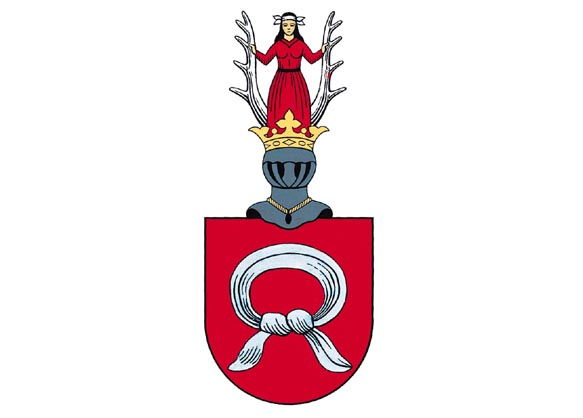Wyszek Raczyński of Raczyn
Wyszek, Wyszko or Wisław Raczyński of Raczyn was a nobleman from Greater Poland with the coat of arms Nałęcz, which was named after Raczyn (near the town of Wieluń). The same predicate was also used by other noblemen, otherwise with the surname Struś (Ostrich) or Strauss, probably relatives of Wyszek. From them the later magnate family of Raczyński is derived.
However, the family circumstances of Wyszko are unclear. His father may have been Maciej of Raczyn, documented in 1390, his mother was Agnieszka, and he may have had three sisters, Małgorzata (wife of Gajko of Lubczyna), Luchna (her husband was Dobrohost ), and a third, unknown by name, who was married to Andrzej, the mayor (fojt) of Poznań.

Nałęcz coat of arms, source Encyklopedia PWN
Wyszek first appears in the sources in nearby Wielun in January 1415, together with Matěj Struś, on a charter of the mayor of Wielun, Wierusz. Shortly thereafter, this nobleman held as a lease or pledge two villages belonging to Jan Czarnkowski of Czarnków (later Poznań subchamberlain) - Dębe and Śmieszkowo (also in Wielkopolska, near Czarnków). However, both villages soon became the subject of a court dispute in 1418, when Wyszko was expelled from them by their owner together with 3 other knights. The whole dispute was still being settled in 1422, and eventually Wyszek received compensation of 20 marks from Jan of Czarnków and another 16 marks from his partisans.
At that time Raczyński was already in Bohemia. This is indirectly evidenced by the so-called inhibition charter of Władysław Jagiełło of 21 April 1421. An inhibition charter is a document issued by the monarch ordering the courts to suspend a trial because one of the parties cannot attend the trial due to a war campaign or a mission. The royal charter directly states that Wyszek “is engaged in the King’s service”. The same document was also shown to the court in Poznan in December 1422.
A petty Polish nobleman became part of the great history. At the turn of 1420 and 1421, the Hussites approached the Polish king with an offer of alliance and the possibility of gaining the Bohemian kingdom. Władysław Jagiełło refused the offer of the crown and advised the Hussites to negotiate with his cousin Witold. This monarch did not directly accept the Czech crown either (there are disputes among historians as to what he promised or hinted to promise), but sent Sigismund Korybut to Bohemia as his representative. The presence of Wyszek in Prague is confirmed by a letter of the Prague people to the Lithuanian Grand Duke Witold in June 1421, in which they mention Wysskonis Raczynsky and Hynek of Kolštejn as members of his envoy. F. M. Bartoš calls Wyszek directly Witold’s confidant; this historian also believes that it was he who had a German letter written in which he begged Witold to come to Bohemia. Jarosław Nikodem, in turn, assumes that Witold accepted the Hussites’ conditions in the first half of 1421 and sent Wyszek to Bohemia at the end of May.
It is assumed that Wyszek continued to stay in Bohemia as a member of Sigismund Korybut’s retinue; two villages in Greater Poland were returned to the Czarnkowski family at this time. The next mention of him is not until April 1427, according to the Song of the Capture of Sigismund Korybut; according to the song, however, he sided with the Hussites who captured the Jagiellonian.
From this moment at the latest Wyszek was close to the radical brotherhoods; Roman Heck, for example, believes that he was one of the leaders of the Hussites in Silesia. It is certain that he connected the end of his life with Jan Roháč of Dubá. The chronicler Bartosek of Drahonice mentions him (Wysko, miles de Polonia) as one of the defenders of Sion, right after Roháč. Together with Roháč, the knight from Poland (Viscone, milite de Polonia) was first tortured in the Old Town Hall and then hanged on 9 September 1437, the Old Czech annals state that he was hanged on the second of the three levels of the gallows.
.png)
The Execution of Jan Roháč of Dubá, Czech-Moravian Chronicle, Wyszek Raczyński in the second row on the left in traditional Polish clothing, source: Digital Library
It is not certain whether Wyszek Račinský maintained contacts from Poland since the early 20s, nor whether he had a wife and children.
While other Polish knights (Dobesław Puchala, Peter Polak, Fedor Ostrozhsky, but also Sigismund Korybut) fought in the Czech lands for honour and glory, Wyszek Raczyński was, according to Jerzy Grygiel, the only knight who was a convinced Hussite.
References:
F. M. Bartoš, České dějiny II/7. Husitská revoluce I. Doba Žižkova 1415 – 1426
Antoni Gąsiorowski:, Raczyński Wyszek, Polski Słownik Biograficzny, T. XXIX, p. 666
Jarosław Nikodem: Polska i Litwa wobec husyckich Czech w latach 1420-1433. Studium o polityce dynastycznej Władysława Jagiełły i Witolda Kiejstutowicza
Jarosław Nikodem: Od Brna do Igławy : husyckie misje dyplomatyczne z lat 1419-1436. Kwartalnik Historyczny R. 121 nr 1 (2014)
Roman Heck: Śląsk w czasie powstania husyckiego, In: Szkice z dziejów Śląska, W. 1955
Jerzy Grygiel: Rycerstwo polskie wobec husytyzmu i idei krucjat antyhusyckich, Idō - Ruch dla Kultury : rocznik naukowy : [filozofia, nauka, tradycje wschodu, kultura, zdrowie, edukacja] 4